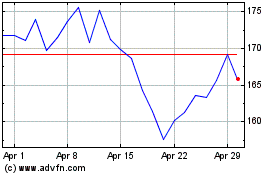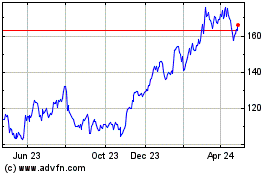By Asa Fitch
This article is being republished as part of our daily
reproduction of WSJ.com articles that also appeared in the U.S.
print edition of The Wall Street Journal (May 24, 2019).
This week's court ruling against Qualcomm Inc. was more than a
business setback: It came with a stinging rebuke of the chip
giant's leaders from the federal judge who delivered the
decision.
Federal District Judge Lucy Koh repeatedly criticized Qualcomm
executives for their sworn testimony during the Federal Trade
Commission's antitrust case against the chip maker, pointing to
discrepancies between their words and the evidence.
Judge Koh called out Qualcomm witnesses including Chief
Executive Steve Mollenkopf, President Cristiano Amon, and retired
co-founder Irwin Jacobs for what she said were dubious statements
and, in some cases, for their demeanor on the stand.
"In addition to giving testimony under oath at trial that
contradicted their contemporaneous emails, handwritten notes, and
recorded statements to the IRS, some Qualcomm witnesses also lacked
credibility in other ways," Judge Koh wrote. She said that the
court "largely discounts Qualcomm's trial testimony prepared
specifically for this litigation," relying instead on that
contemporaneous evidence.
Judge Koh, in a ruling made public late Tuesday, found that
Qualcomm unlawfully suppressed competition in the market for
mobile-phone chips and used its dominant position to exact
excessive licensing fees.
Qualcomm sharply criticized the ruling, in which Judge Koh
raised scant concerns about witnesses the FTC called. She didn't
refer, positively or negatively, to the FTC's main expert witness,
Carl Shapiro, an economics professor at the University of
California, Berkeley, whose arguments Qualcomm had sought to
discredit. Qualcomm said it would pursue a stay on the judge's
order and an appeal.
"Qualcomm believes many aspects of Judge Koh's decision are
flawed, and [the decision] disregards many key facts that
contradict her conclusions, " Mr. Mollenkopf said. The decision
"also, without basis, casts aspersions on our company and its
witnesses, all of whom have demonstrated their complete integrity
and expertise successfully many times in multiple legal disputes
around the world."
Messrs. Amon and Jacobs didn't respond to requests for
comment.
Qualcomm's top brass had been in a celebratory mood since
mid-April, when the company signed a deal with Apple Inc. that
ended a lengthy and bitter legal dispute that threatened to
undermine the chip maker's business model.
The deal lifted a cloud that had hung over Qualcomm for years,
and sent its stock soaring by more than 50%. In recognition, five
top executives were awarded bonus shares. Mr. Mollenkopf's were
valued at around $3.2 million as of Tuesday's close; Mr. Amon's, at
around $1.9 million.
Judge Koh's ruling again throws doubt on Qualcomm's outlook.
Qualcomm shares have fallen sharply from the highs they reached in
the weeks after the Apple deal, and were down 1.5% Thursday. They
have now dropped more than 20% since last Wednesday's close.
The judge said the executives' testimony during the antitrust
trial, which took place in January, didn't align with their notes
and internal documents, and was evasive in other ways.
Mr. Mollenkopf testified he wasn't aware of Qualcomm ever
exercising its right to cut off chip shipments to a customer if
there was a dispute over royalties, Judge Koh wrote. But she
pointed to a case where Qualcomm had done it to Sony, and
enumerated at least seven others in which she said a cutoff had
been threatened, affecting customers including LG Electronics Inc.,
Samsung Electronics Co., Huawei Technologies Co., Motorola
Solutions Inc., Lenovo Group and Nokia Corp.
Mr. Amon testified that he hadn't been informed of such threats
being used as a negotiating tactic, the judge wrote, though he
"himself approved joint QTL and QCT plans to cut off chip supply
during patent licensing disputes." QTL and QCT are Qualcomm's two
main business units.
Another executive "pretended not to recall" a meeting with the
Internal Revenue Service until he was played an audio clip from it
and made reference to a disagreement that came up later in the
recording, she wrote.
Patrick Moorhead, the president of Moor Insights & Strategy,
called it odd that the ruling was so one-sided when there were
significant questions about the reliability of the FTC's chief
expert, Mr. Shapiro. Mr. Shapiro put forth a theory of how Qualcomm
could cause anticompetitive harm, but offered no on-ground evidence
that actual harm had been done.
Mr. Shapiro declined to comment.
As Qualcomm seeks relief from higher courts, Mr. Mollenkopf
said, "We will continue focusing on running our business and
delivering every day for our customers and shareholders."
Write to Asa Fitch at asa.fitch@wsj.com
(END) Dow Jones Newswires
May 24, 2019 02:47 ET (06:47 GMT)
Copyright (c) 2019 Dow Jones & Company, Inc.
QUALCOMM (NASDAQ:QCOM)
Historical Stock Chart
From Aug 2024 to Sep 2024

QUALCOMM (NASDAQ:QCOM)
Historical Stock Chart
From Sep 2023 to Sep 2024
